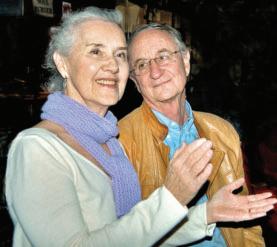
4 minute read
LAST STAND
LAST STAND Remembering Lynne Turley
“That town lost something when they lost her. Unsung artist. Unsung genius. Unsung social giant.” — Perry Michael Allen
BY SUSAN DYNERMAN
Lynne and Henry
Lynne Jordan Turley — born Martha Lynne Jordan — was a true original. Irreverent. Stylish. Fearless. Talented. And smart as the dickens. She was the most independent woman I’ve ever known.
Her roots in Selmer, Tennessee, were her making. Parents Tedford and Louise Jordan owned a dry goods store there, and she grew up in a home full of love. “A love that the rest of us try to have,” says Doris Dark, her third cousin. “ ey cared for all people. As for Lynne, I don’t think she ever met a stranger.” Even as a young girl, she played piano for church services and for their gospel quartet. Says Dark: “ ey sang gospel songs, expressing love, good will, and praise.” Music became Lynne’s driving force.
Her CV is impressive: St. Louis Institute of Music. Degrees from the U of M in music, and curriculum and instruction. More than 20 years with Memphis City Schools. One of six teachers who developed its groundbreaking Orff Music Program. Orff Music Supervisor. A host on WKNO-TV children’s programs. Producer/ host of the kids’ show Sneakers on Channel 5. With musician Perry Michael Allen, co-host/ co-writer of Pass it On, produced jointly with WKNO. Eight years in New York at McGraw-Hill, then Scholastic. Co-founder of the Lynne and Henry Turley Center at Rhodes College.
But it’s nothing compared to the person she was, the life she lived, and the lives she touched. In the ’70s, she was part of Memphis’ tight-knit music scene that included Willie Mitchell, Al Green, and Jim Dickinson. She made lifelong friends in the industry, among them Jill and Jim Lancaster and Joe Mulherin. Early on, she teamed up with Allen to produce commercials and write scripts. “She was ahead of her time,” he says. “When we fi rst met, she was already into social justice. Talking about what the school board should be like in Black neighborhoods and teaching somewhere in Orange Mound. at’s what amazed me.”
Lynne connected and collaborated with people. “I’m a doer, not a talker,” she used to say. In 1977, she met her match in Henry Turley, both in their late thirties. He had embarked on the revitalization of Downtown. “I always refer to Lynne as ‘Lynne Jordan’ as an expression of respect,” he says. “An acknowledgement that she was a complete and accomplished person before she met me.”
Two unconventional souls, they were an unconventional couple — together almost 20 years before they married. When she lived in New York, she came home on weekends. When they had people over, it was an eclectic mix from all walks of life.
Political, progressive, engaged, Lynne was funny. Gayle Rose tells this story: “We supported Gore. And I remember when GW [Bush] was elected. Henry and Lynne and I were going to watch his State of the Union. Lynne says: ‘I just can’t watch.’ Henry says, ‘I’m struggling too.’ Lynne gets up and comes back with three paper grocery bags and suggests we put them on our heads. ree of us put the sacks on our heads. And she says, ‘It’s not working.’ So we turned the TV off .” e marriage worked just fi ne. Lynne could have stayed in New York; she loved it up there. Says long-time friend and collaborator Traci Sampson: “She decided to come back because she was so in love with Henry. And with the life Henry had created in Memphis — what he was doing in terms of building community. at was just as important to her and matched how she saw her life here. And she loved Memphis.”
“ ey will forever be one of the greatest love stories I have ever known,” says LaWanda Hill, friend, educator, and a pallbearer at Lynne’s service. “Henry is rough and tough as he can be, and just the thought of her melts him. You can see it in his eyes when he looks at her. It’s like he’s captivated. And you’d look at her and see that it was reciprocated.”
Maybe 10 years ago, people started noticing changes in Lynne. Her mother died of Alzheimer’s, so Henry started taking her for check-ups. On days when it was particularly disorienting, she’d say, “It’s my MCI.” Mild Cognitive Impairment. Just that. She pushed on, always. Plus, there was Henry. And music. “We were at a Hattiloo benefi t and ended up going to Bari,” says Sampson. “Sitting at a table, she remembered a song her father used to sing. All of a sudden Lynne burst into song. She was talking about her father. She just sang his song. When she was fi nished, people burst into applause. She’s beaming. And they’re all, ‘Bravo!’ And then everybody went back to eating dinner.”
That was Lynne. She died April 22, 2021, at 79, original to the end.
Susan Dynerman began her writing career at Memphis magazine in the late 1970s, around the same time she fi rst met her old friend, Lynne.









